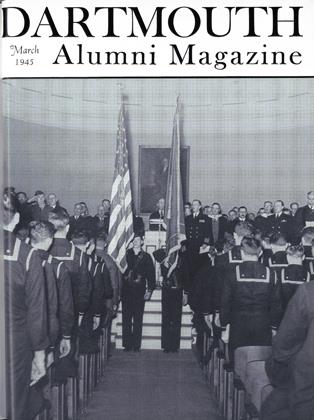PRESIDENT HOPKINS AMONG THOSEIN FAVOR OF MILITARY TRAINING
PRESIDENT HOPKINS was one of the fourteen heads of leading U. S. educational institutions who urged prompt decision on the subject of compulsory post-war military training in a recent letter to President Roosevelt. The other college and university heads who joined President Hopkins in signing the letter included Charles Seymour of Yale, Karl Compton of the Massachusetts Institute of Technology, Stanley King of Amherst and Thomas S. Gates of the University of Pennsylvania. The heads of Northwestern, Rutgers, Lafayette, Pittsburgh, Cooper Union, Temple, Florida, Muhlenberg, and Georgia School of Technology were also among the fourteen.
The action was taken by President Hopkins and-the other college heads in opposition to an earlier letter signed by the presidents of twelve colleges and universities which advocated a postponement of consideration of the matter "at least until complete victory over Germany is achieved" so that the American people will not act "under the tensions of war psychology in order to bring them to a decision which, it is said, they would not reach under ordinary conditions."
President Hopkins and the other educational heads in their letter to the President refuted this stand. "We," they said, "whose signatures are appended to this letter believe that this proposition should be thought through now, while we are conscious of the realities of a world at war. As a nation we are better able at this time to reach a wise decision on this important matter then we shall be after the war is over, when again we shall be lulled by a false sense of security.
"Contrary to the opinion expressed by some, we believe that the judgment of the people of the nation is now more sound on this issue than it will be after peace is declared. We know too well the reaction which occurs after a conflict is over: the general desire to 'forget it.' "
Four reasons were stated by the presidents for their argument in favor of a prompt decision for compulsory military training.
"If adopted now," they said, "we believe that a sound plan for universal military training will enable the United States to speak with greater authority at the peace table in favor of an international organization to enforce peace its adoption now will reassure the other peace-loving nations of the world that the United States proposes to cooperate with them in outlawing war and will not again retreat into isolationism—it is more fitting in our form of government to insure national security through a democratic plan of military training rather than through the maintenance of a large professional standing army—the adoption of a proper plan of universal military training involves no perpetual commitment."
The twelve education heads whose ob- jections to immediate action on a bill providing compulsory military service are opposed by President Hopkins and the thirteen other college and university presidents include Presidents Conant of Harvard, Wriston of Brown, Dodds of Princeton, and Day of Cornell.
 View Full Issue
View Full Issue
More From This Issue
-
 Article
ArticleSCHOOL FOR CRAFTSMEN
March 1945 By C. E. W. -
 Class Notes
Class Notes1929
March 1945 By F. WILLIAM ANDRES, T. TRUXTON BRITTAN JR. -
 Article
ArticleLaureled Sons of Dartmouth
March 1945 -
 Class Notes
Class Notes1918
March 1945 By ERNEST H. EARLEY, DONALD L. BARR -
 Article
Article'Round the Girdled Earth
March 1945 By H. F. W. -
 Class Notes
Class Notes1919
March 1945 By J. KENNETH HUNTINGTON, MAX A. NORTON







